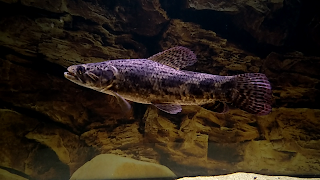The fish readily took market prawn the next day and also frozen fish. The fish was most time parking in the corner 95% parking and 5% swimming. After a week it was quite boring and I spoke to kitty Lai who had his Aimara for a couple of months. He taught me the old trick and that is to comm it. Well comm Aimara? a risky move, but seem he had success with comming his with Giant Gourami. He had failed comm in his first few attempt, The trick is to comm with broad body fish.
Initially I was looking for Black Oscar as tank mate to make it all South American but I couldnt find any around. And I chance upon a hybrid Giant Gourami the body also in my wish list, flat back long body always my favorite shape which is very hard to come by.
So day 1 me and the GG was terribly nervous. I kept the light on 24hrs. The GG survived the first night and I also noticed the Anjumara became territorial and started swimming about. It did not attack the GG but challenged it a few times. The first week there was some minor split fin thats about it.
The comm proves to be a success, the Anjumara now swims 70% and park 30%, much more responsive when comes feeding. After a month the Anjumara is now 13", the GG is still swimming happily. The Anjumara will takes in everything including sinking and floating pellet.
My conclusion with Anjumara is that its an over rated fish. Most ferocious fish in the world seem exaggerating. Obviously those who rated this has never experienced a Micropeltes. Micro will put anything in its mouth and decide if its food. And they're lightning fast. Anju tends to hesistate and are always suspicious. They attack with cautious. Don't get me wrong they do bite. They behave more like the Wallago Attu, when you closed in on them only they attack. This conclusion is not only from my experienced but shared and concluded together with a few other Anju players.
Still a nice fish and a great experience, mainly they looked so Jurassic and they loved hoovering in mid tank and with all those finnage somehow reminds me of the coelacanth.












Comments
Post a Comment